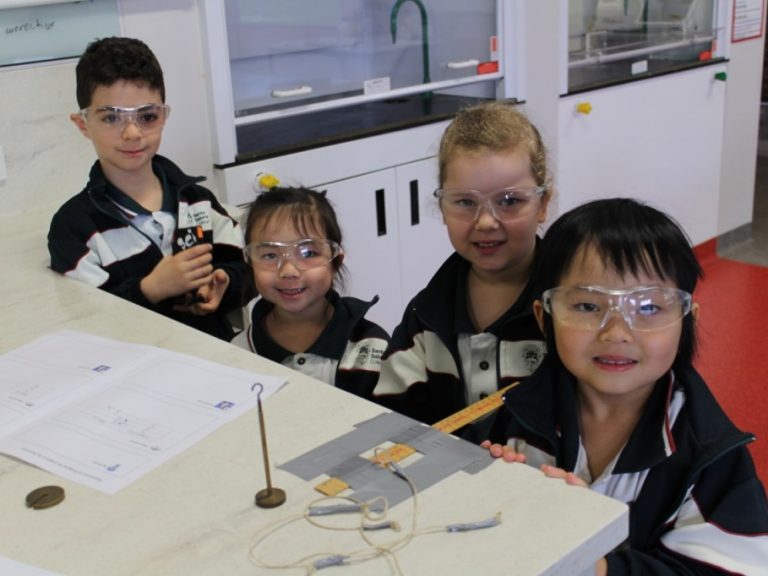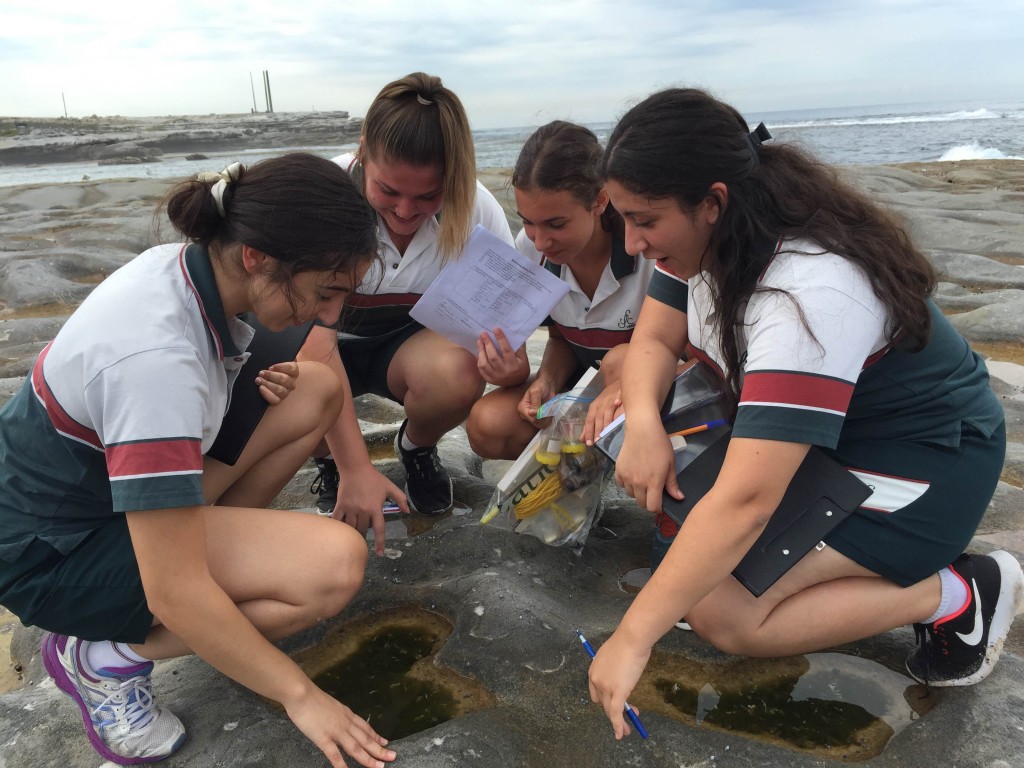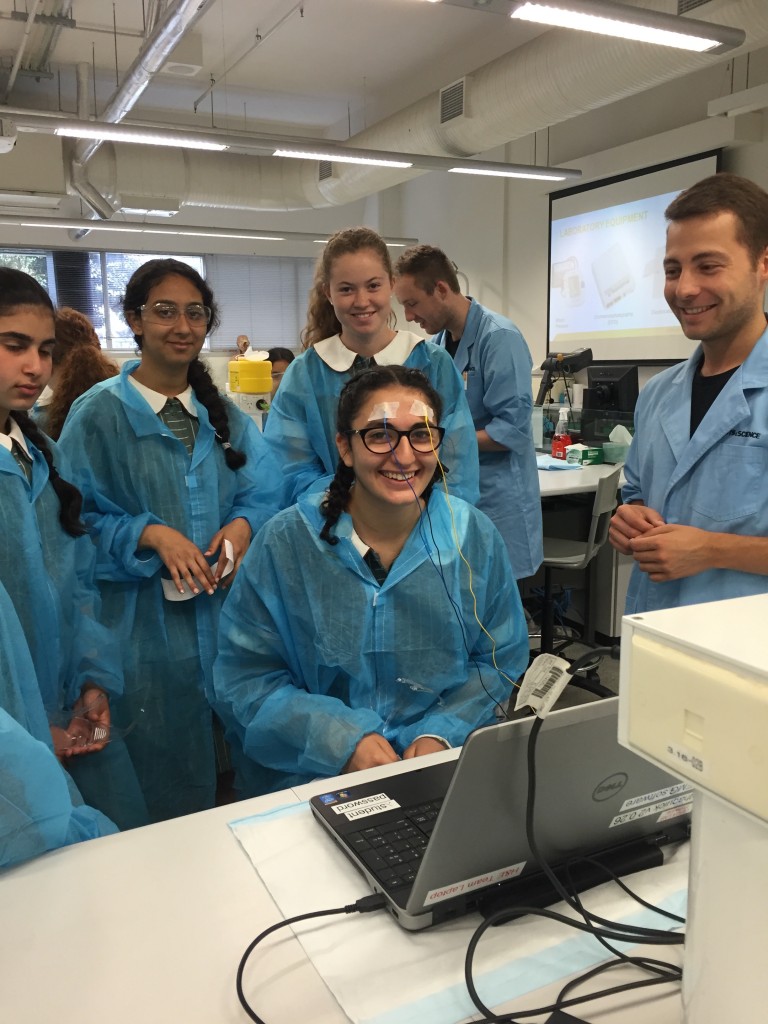One of our goals at Santa Sabina College is about making our students scientifically literate. Scientific literacy enables us to understand the way our world works and to interact with our environment.
“I don’t need to have answers to everything, I want to have answers to find.”
Professor Brian Cox OBE
Students who study Science are encouraged to ask questions, simple or complex; to wonder, to explore, to inquire, to have the courage to ask “WHY?” They are encouraged to be curious and to step out of their comfort zone and to “do” Science. This is what it means to be scientifically literate. At Santa Sabina “doing” Science encompasses a range of different learning experiences.
This could be the making a model of an animal cell or conducting a firsthand investigation to determine the effect of inertia on the breaking force in a string. For our Year 7s it is a visit to Taronga Zoo to learn about the classification of animals and to consider the social, moral and scientific role of zoos from the perspective of an animal rights activist, a tourist or a scientist. For others it is taking part in a viva voce discussing transgenic species or being a member of one of the teams that take part in the NSW Titration competition at Sydney University or being challenged to think critically while completing the ICAS or Big Science competitions. For our younger students crossing The Boulevarde to “do” Science in the laboratories “like the big kids” allows them to take their learning to another level. All students from Kindergarten to Year 5, as part of their units of inquiry, experience a lesson organised by our dedicated and passionate Science staff. Questions are asked and wonder and curiosity fill the room. What are the properties of light? How do forces make objects move? There is not a day that goes by where a question is not asked.
Last year our Year 10 students attended Santa’s inaugural STEM Conference focused on “the importance for women to be involved in STEM for a better future”. Thinking and problem-solving like an engineer was one of the hands-on sessions all students attended. Bionic hands were made and traffic flow problems were resolved with the assistance of engineering students from University of New South Wales. The “doing” Science continued throughout the day as students took part in Forensic Science workshops run by the Outreach Program University of Technology or attended lectures presented by Professor De Marco, an astrophysicist from Macquarie University. Other sessions included lectures that dealt with big questions on nanotechnology and how artificial hearts work or on human credence within robots from Dr Chris Stanton from the University of Western Sydney. Dr Mac Ritchie further promoted the diversity of Science by creating a connection between scientific discovery and music. The day enabled students to explore their areas of interest, ask questions, become more scientifically literate and wonder where their current interests could take them in a career path that involved STEM.
“Doing” Science doesn’t get any better when you are given the opportunity to be part of the audience at ABCTV’s Q&A program and ask questions about stuff that matters like climate change and how is it possible that every event is happening at the same time and one of the panellists is Professor Brian Cox. Some of our passionate Science students were able to ask Professor Brian Cox these questions directly and continue their scientific conversations with him when he took the time to introduce himself to the girls.
Taking part in the first two-week NASA Space School Trip organised by the Alliance of Girls Schools was another opportunity taken up by many of our Science students to practise becoming more scientifically literate and ask questions as they took part in space mission simulation training and in some hands-on problem solving sessions. They worked collaboratively using their critical thinking and engineering skills. Our girls were encouraged to ask “why?” and to dream big.
Our Year 11 Biology students embarked on an ecology field study while our Year 12 Biology and Senior Science students visited the Museum of Human Diseases. Our Year 12 Chemistry students visited ANSTO (Australian Nuclear Science and Technology Organisation) and learnt about the uses of radioisotopes and how a nuclear reactor works. Their visit to Sydney Water’s recycling water plant allowed them to learn how water is treated and how all those chemical reactions learnt in class are applied to every day real world situations.
Congratulations to our Year 12 students who not only achieved excellent results in Biology, Chemistry, Physics and Senior Science but also are to be commended on their diligence, dedication and resilience they showed towards their study of Science.
“Doing” Science for our Year 10 students towards the end of the year as they began their Year 10 Step Up Program looked very different. They attended hands-on workshops on microbiology, data and analytics, physics and physiology. Just like our little ones crossed The Boulevarde to “do” Science like the big kids in the Santa labs, our Year 10s did Science on campus in the Science laboratories at the University of Technology for two days. During the Step Up Program our Science students were provoked to think creatively and critically about the world they live in by taking part in scientific experiences in their very own city of Sydney. One of the driving questions – how does contemporary art encompass scientific skills and thinking – led them to a day at the Museum of Contemporary Art. Students here immersed themselves in the Today Tomorrow Yesterday Collection and the Louisa Primavera Collection before they took part in the electronic art workshop where their scientific literacy skills came into action.
The Science staff are a passionate, dedicated and highly skilled team that has worked collaboratively and enthusiastically to ensure that each student studying Science is given every opportunity to do their very best, be challenged and succeed in Science. We guide our students to become scientifically literate and provide them with a vast array of differentiated learning experiences that foster wonder, curiosity and a safe environment to question. These learning opportunities are given to each student in Science.
“The important thing is to never stop questioning.”
Albert Einstein
Ms Moira De Domeneghi
Head of Science
Some thoughts from the students themselves:
The Year 10 STEM day was an incredibly insightful experience, as it exposed us to the different branches of Science and encouraged many girls to continue to pursue STEM subjects in Years 11 and 12. I had the chance to learn how to write basic codes and make and design a simple bionic hand. As well as the opportunity to complete different workshops, we also had the chance to hear from professional women – all ex-students of Santa – working in a diverse range of fields within STEM. This day was educational, but also fun and inspired me to start considering where my studies in Science will lead me after school.
Gabby
Having the opportunity to attend and feature on Q&A was a great learning experience and a moment that has really benefitted my education. It not only allowed me to broaden my knowledge and better understand prevalent issues and concepts that are challenging our society today from the perspective of various individuals of expertise, but also helped to build my confidence as I needed to deliver a question and think quickly in order to respond intelligently to things that were asked of me.
Kaitlan





